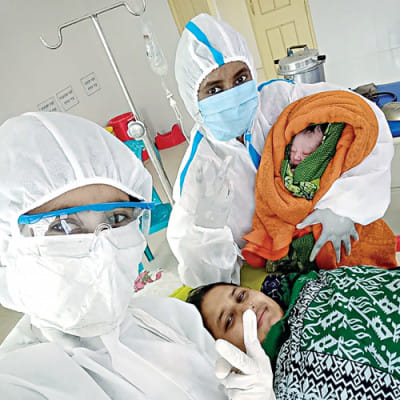Safe motherhood in the time of Covid-19

Complications of pregnancy and childbirth are among the leading causes of women's death in the developing world. The 2020 Safe Motherhood Day, observed on May 28, comes in the backdrop of the added risks to mothers across the world, as the strained health systems struggle to provide essential and life-saving services to women and children. The situation in Bangladesh is no different. The shifting attention of the health systems to respond to the pandemic, restrictions in travel, economic hardships, and the fear of contracting the infection from health care facilities are preventing many mothers from seeking the much-needed care during pregnancy, childbirth and postnatal periods. The declining trends in the utilisation of maternal health care services since the start of the epidemic are concerning.
While the outlook of the pandemic may be grim, there is still a lot to cheer about. One of them is the valiance and determination of the hundreds of health care providers, who continue to provide life-saving services to women and children. On the occasion of this Safe Motherhood Day, I would like to pay tributes to some of the champion health workers, who are standing strong with the Bangladeshi mothers in the fight against Covid-19. They represent the spirit and resolve of the thousands of doctors, nurses, midwives, paramedics and other health workers who are saving lives every day.
Beauty Akhter, an infinitely courageous midwife, works at the Jonaki Guccha village of Nilkomol Union in Haimchar upazila, Chandpur. Jonaki village is a remote riverine island, with no electricity, water supply or any such civic amenities. To reach the village, one has to travel across the Meghna river and then about two and a half hours on foot. During the rainy season, communication is worse and travel is risky due to the high tides. When not travelling to 25 settlements to visit her patients, Beauty provides essential services for mothers and children from a makeshift building with two rooms and a tin roof, set up by the Union Parishad. One of the rooms is used as her residence so that she can serve round-the-clock. The villagers here have heard very little of the Covid-19 pandemic, mostly from word of mouth and the few solar-powered televisions that are present. They do not understand social distancing as they continue to go about with their lives to make ends meet. In the midst of all this, Beauty is trying to provide healthcare services to women to the best of her abilities. More than the fear of Covid-19, she fears the lack of awareness and the social and economic adversities that women face on their journey to motherhood.
Another midwife working at the Shahebrampur Union Health and Family Welfare Centre of Madaripur district is Hosneara Akter. Her round-the-clock availability and devotion attracted most women to visit the centre until the first Covid-19 patient was identified in Madaripur in mid-March. Like everywhere else, families were frightened to go out of home for medical assistance. Given the number of mothers due to deliver soon, Hosneara felt the need to continue maternal care services though it posed a risk to her own life. She engaged local elected members to reassure the mothers that the centre is open for services and is safe. Hosneara kept calling mothers on their mobile phones reminding them of their check-up and delivery dates as well as how they should maintain health safety instructions during Covid-19. She set up a handwashing corner outside her healthcare centre to maintain hand hygiene, arranged protective gear for herself, and followed the guidance received from her supervisors.
Nurun Nahar Begum works as a paramedic at the Union Health and Family Welfare Centre set up by the Union Parishad in the remote island of Nijum Dip in Hatiya, Noakhali. She has been serving here for the last three years and, before the pandemic struck, would provide services to an average of 150-200 mothers, including about 20 deliveries, every month. But since March, as fear of Covid-19 grew and movement became restricted, the numbers have gone down by about half. These are not the only challenges she is facing. Nurun Nahar is unable to maintain social distancing protocols among clients during satellite clinic visits. Living far away from her family, she is bravely unbending when it comes to providing healthcare services to the community.
Every day, our health workers are trying their best to save lives in these difficult times. Beauty, Hosneara, Nurun Nahar—these are just names for many of us. To their dear ones, they are more than that. Despite their families' concerns, frontline health workers like them are continuing their services during this pandemic in the numerous public healthcare centres all over the country, starting from community to district level. Worries surrounding Covid-19 sink their hearts too, yet they would not pause for a while as, according to them, they chose this profession and there is no room for compromises. To reach the remotely located population, there are over 4,400 union-level healthcare centres providing essential healthcare services in Bangladesh. Women mostly depend on these centres for maternal and newborn care services and safe normal deliveries as these centres offer round-the-clock services. On behalf of all mothers, let us be appreciative of these heroes for making motherhood safe in the time of Covid-19.
Joby George is the Chief of Party of USAID's MaMoni Maternal and Newborn Care Strengthening Project.

 For all latest news, follow The Daily Star's Google News channel.
For all latest news, follow The Daily Star's Google News channel. 



Comments